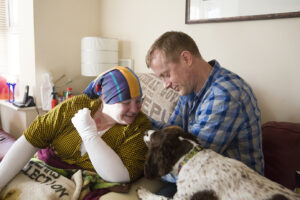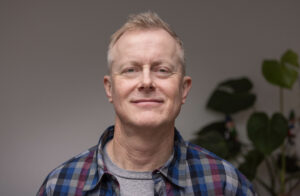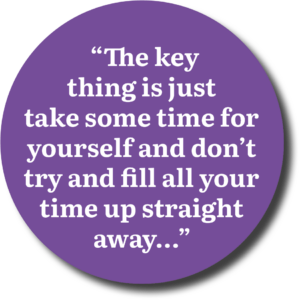 Richard cared for his wife Yvonne from 2016 until she passed away in April 2023. This is his story.
Richard cared for his wife Yvonne from 2016 until she passed away in April 2023. This is his story.
Yvonne’s presence is everywhere in the family home she shared with Richard and their two children in Cambridgeshire. Her quirky collectables sit on shelves and hang from walls. There are colourful wooden flowers, duck ornaments with bright boots on, and the head of a striking hand-knitted lion looming over us as we talk.
Yvonne passed away from breast cancer in spring 2023 when she was just 48 years old. Although she’d previously had a double-mastectomy the cancer returned in 2016 and she endured seven cycles involving multiple rounds of chemotherapy. Richard describes how the effects of the chemotherapy “nearly killed” Yvonne. None of the side-effects she had were unique, but the fact that she had all the possible side-effects at the same time was rare. Despite this, Yvonne did not want to stop treatment as she could not live with herself if she hadn’t tried all possible options. Eventually treatment had to stop. By that time the nerves in her legs were badly damaged by the chemotherapy and she needed to use a wheelchair. Other cancer treatments were given in 2016 and 2017 and despite setbacks along the way, Yvonne was able to resume some of her work as a teaching assistant at a local primary school, which she loved.
However, in 2022, Yvonne collapsed at home. It became clear the cancer had returned once again. Sadly, this time the doctors informed the couple it was terminal. After another couple of spells in hospital in January 2023 Yvonne decided she didn’t ever want to go back into hospital. She passed away at home with Richard and their children at her side in April 2023.
For Richard, his experience of caring has been one of ups and downs – the lows of Yvonne’s cancer treatment and the better times when she recovered from treatment and was able to adjust to her new restricted daily life. He describes her as “fiercely independent”, much-loved by her big Irish family, and a close network of friends.
Initially, Richard tells me, he wouldn’t have called himself a carer, as although Yvonne was ill and he was caring for her, she was having treatment. As far as they were concerned, it wasn’t a permanent situation. He describes how he had been on the journey of cancer diagnosis and treatment with Yvonne over many months, and so adjusted to this new state in their relationship, although it was hard to find the help and advice he needed from the NHS. However, he had recognised that the children, Malachy and Robin, were young carers and needed support. Richard was referred to Caring Together by his GP. He signed up for an emergency ‘What If’ Plan and got support for the children who were aged nine and 13 in 2016.
The children were of course hugely impacted by their mum’s illness. In addition to the emotional stress, the cancer meant they couldn’t always do the things other families did because Yvonne wasn’t well enough, or the couple simply didn’t have the head space to organise days out or activities when they were dealing with so much at home.
Although Richard was Yvonne’s primary carer, the children also had a role in caring for her. Malachy was supported at a Young Carers Group run by Caring Together in his primary school and both youngsters went on trips to places like Grafham Water and the cinema with our Young Carers service. This gave them time with other children, and our specialist workers, to simply have fun and a break from the situation at home.
It also relieved the guilt Richard was feeling that they were missing out on ‘normal’ life.
 Richard reflects on how caring for Yvonne affected their relationship as a couple. It was important to him to be coping and doing what needed to be done for Yvonne, but he now realises he also needed to feel sadness and grief, especially in the final weeks of her life.
Richard reflects on how caring for Yvonne affected their relationship as a couple. It was important to him to be coping and doing what needed to be done for Yvonne, but he now realises he also needed to feel sadness and grief, especially in the final weeks of her life.
“There are times that she couldn’t understand why I wasn’t getting emotional, and I’m just like, ‘well, I need to do this’ and that’s it. I have to, as this is how I cope. And sometimes, maybe you don’t need to do the coping. You need to do the not coping. And actually, I wish I’d done a bit more of that, especially in the last few months. But you’re kind of conflicted between ‘I’m doing alright, let’s just get on with things’ so she doesn’t have the guilt that she’s leaving.
“There are times where I was a carer more than a husband. And needs must. But you end up losing the intimacy… the intimacy of just holding hands.”
It was in Yvonne’s final weeks that Richard really struggled to cope emotionally and physically with caring for Yvonne, and a significant change to his caring role. Medical professionals were in the home and looking after her, meaning it was no longer just the family at home. Although Richard needed and appreciated their help, it was another big change to adjust to.

“I think probably early March I hit a wall and I’ve just gone ‘I can’t’. But not ‘I can’t do this’ because you do it, you just do whatever.
“Yvonne was ready to die, and it’s almost like when she died, there’s a strange sense of relief , which is quite hard to deal with because you don’t want her to die, but you know that this is what she wanted. If everything was fine, she’d still be here and we’d have a lovely life and grow old together…
“And so you get to the final part, and you just want it to happen. You just want to get it over with. And then she’s gone, and you feel guilty. It’s silly to feel guilty, but it doesn’t stop.”
Today, Richard is receiving bereavement support as he adjusts to losing Yvonne, and other changes in his life. Robin is at university and Malachy is studying for A-Levels. When I ask him is there any advice he would give to other bereaved carers, he thinks for a moment and replies, “I think that the key thing is just take some time for yourself and don’t try and fill all your time up straight away… just take some time for yourself. If you’ve got family or friends, spend time with them. It’s really important to get over the exhaustion and recover from those final months.”
In memory of Yvonne
After Yvonne passed away, Richard and the family invited donations to be made to Caring Together in Yvonne’s memory. Over £700 was donated. This is now being used to help other unpaid carers locally. He explains why he invited donations to be made,
“If you’ve had the support from Caring Together like I have had, then you can help other carers who may go through a similar thing… it’s comforting knowing some good comes out of all this pain.”





